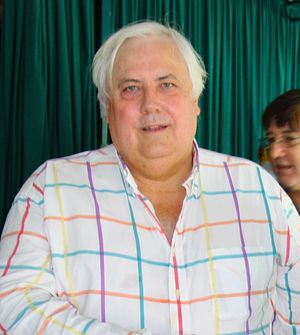When the new Australian Senate begins sitting next month, one unlikely multi-millionaire will hold a whole lot of power.
After previous out-there announcements, Clive Palmer’s declaration in May last year that he would be starting his own political party didn’t seem especially noteworthy.
After all, in the past he had declared he would build a replica of the Titanic, constructed lifesize Jurassic Park-like robotic dinosaurs at his Gold Coast resort, and accused the U.S. Central Intelligence Agency (CIA) of funding environmental activists to undermine the Australian economy. All cause for mirth among his many critics.
However, when the new Senate sits on July 1, one year after his foray into politics, it is the mining millionaire (or billionaire depending on whose estimates you believe) who will have the last laugh.
Palmer is estimated by Forbes to be worth around A$800 million ($747 million) while the Australian publication Business Review Weekly pputs his wealth at A$2.2 billion
The Palmer United Party (PUP) rode a wave of disenchantment with the major parties into last year’s November federal election, with Palmer also spending a big chunk of his own money on advertising. However, the party came out with effectively four federal senators and Palmer himself elected to the Lower House.
The PUP won 5.5 percent of the vote nationally, enough to pick up three senate seats. Palmer then convinced an independent first-time elected senator from a micro-party in the state of Victoria to align with the PUP.
Elected a life member of the conservative Liberal Party, which with its coalition partner the National Party is now in government, Palmer’s split from the Liberals and subsequent entry into parliament was almost entirely unexpected. Yet he may now have the final say on all legislation for the next three years. The Liberals failed to win a clear majority in the Senate and will now rely on PUP senators to pass any legislation opposed by the left-leaning Labor and Greens.
While some of Palmer’s positions are well known –scrapping legislation to charge big polluters for carbon emissions, for one – other PUP policies remain sketchy and populist.
Last month, Palmer announced that he had switched his party’s position on university fees. The PUP had previously supported the kind of deregulation of fees the government proposed in its recent budget. It is now apparently in favor of making university free for all students.
The potential conflict of interest involved in Palmer wielding political power while owning mining companies highlights the inadequacies in Australia’s conflict-of-interest rules. Palmer himself abstained from a vote on carbon pricing legislation in the Lower House, but in the senate where the government needs his votes his senators will pass the legislation.
Since the election Palmer has also seen approval given for a controversial mining port near the Great Barrier Reef, which will greatly benefit his company Waratah Coal.
Known for his Boris Johnson-type publicity stunts, Palmer portrays himself as an anti-establishment politician, appealing to the many Australian voters disenchanted with mainstream politics.
He now finds himself in a position of considerable influence. The government faces an up-hill battle in passing many of its unpopular budget measures. It is unclear how cooperative Palmer will be with his former party. He has previously clashed over staffing allocations, threatening Prime Minister Tony Abbott that no legislation will pass until he gets the staffing numbers he seeks. Staffing is set by parliamentary standard based on the number of senators.
Whether the PUP will be able to continue its success is unclear; Australian politics can be unforgiving for minor parties. For now, though, Palmer holds the keys to government legislation for the next three years. Based on his fiery rhetoric, he seems unafraid to wield his leverage.
































